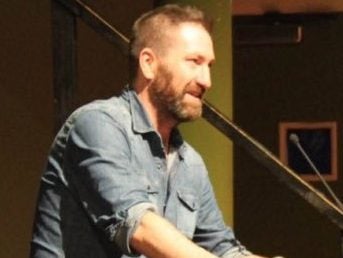
The Morning Star’s international editor was detained and stopped from entering Turkey after being classed a “national security threat” last week.
Steve Sweeney (pictured) attempted to enter Turkey on Thursday to cover the country’s local elections, which were held on Sunday.
But shortly after landing at Sabiha Gockcen airport in Istanbul a police officer “bundled” him into a holding area and took his phone, according to his own account of events published in the Morning Star.
Sweeney said he was not told the reasons for his detention at any point, and that he was photographed and forced to unlock his phone, making him nervous for the safety of his contacts despite taking “stringent” security measures.
He also said he was not allowed to contact the British consulate, despite it being his legal right, and that police initially denied to his friends in Turkey that he was being held.
He was reported as a missing person after friends in Diyarbakir, where he was meant to travel next, said he did not arrive.
Sweeney wrote on Friday: “The implications of this are sinister. With no record of my detention and a denial that I was being interrogated at the airport, anything could have happened to me.
“I could easily have disappeared at the hands of the Turkish state and they would simply have denied any knowledge of what had happened to me or my whereabouts.
“The murder of Jamal Khashoggi flashed through my mind. It is not beyond the realms of possibility for the Turkish state to carry out a similar act.”
Today marks the six-month anniversary of the murder of Washington Post columnist Khashoggi, who was killed in the Saudi consulate in Istanbul.
Turkey is ranked 157th out of 180 countries in Reporters Without Borders’ 2018 World Press Freedom Index.
Sweeney said he faced a “brief and incompetent” interrogation about his plans in Diyarbakir, his job, and his views on Turkish political groups.
Finally, he was sent back to London where his phone and passport were eventually handed back by counter-terror police.
Only then did he discover that he had been stopped from entering Turkey because he was deemed a national security threat, although no reasons or evidence for this were given.
Sweeney wrote that he has now been effectively banned from Turkey, leaving him “utterly heartbroken” by this “flagrant attack on press freedom”.
He has previously travelled to Turkey on a number of occasions to meet with trade unionists, academics, journalists and politicians.
“I will be calling on the Foreign Office to take measures to ensure that journalists are able to report freely and without fear of arrest or intimidation,” he said.
“Now is also the time for journalists and the labour movement to speak out against the atrocities and attacks on press freedom and democracy in Turkey. More journalists are in jail there than any other country in the world, with many others self-censoring for fear of reprisals.”
Michelle Stanistreet, NUJ general secretary, said: “Journalists should be able to carry out their work in Turkey without fear of intimidation and persecution.
“The union is supporting Turkish journalists who have been incarcerated by the brutal regime in Turkey which has abused press freedom at all levels.
“Steve Sweeney should have the right to carry out his job as a journalist and not be denounced in a trumped-up accusation of being a security threat.
“That is why we are supporting the adoption of the IFJ’s draft UN Convention on the protection of journalists to protect the rights and safety of the press.”
The draft convention, which is supported by about 60 media groups along with representatives from countries such as Tunisia, Morocco and Palestine, sets out obligations to protect journalists from threats on their lives, properly investigate crimes against them, stop arbitrary arrests and safeguard the anonymity of sources.
Other international press freedom groups including English PEN, the International Federation of Journalists, Index on Censorship and the European Federation of Journalists sent messages of support to Sweeney.
A spokesperson for English PEN told the Morning Star: “Sweeney is one of many international journalists and activists to have travelled to Turkey in recent years, both to report on his findings and to show solidarity with journalists on the ground, many of whom have been similarly detained.
“Journalists –both those from Turkey and their international colleagues – must be allowed to report freely, especially on matters of such clear public interest as elections.”
A Foreign Office spokesperson confirmed it had provided assistance to a British man who was deported from Turkey.
They added: “The UK is committed to the promotion of media freedom and the protection of journalists.
“The Foreign Secretary will host a two-day international conference on the issue this July in London, part of a major campaign to shine a spotlight on the issue, raise the cost to those who target journalists for their work and galvanise a consensus behind the protection of journalists .
“Media freedom is under attack across the world, and we constantly raise media freedom as part of ongoing discussions with host governments about human rights and democracy.
“It is the UK’s belief that Freedom of the media, and freedom of expression more broadly, is an essential quality of any functioning democracy.”
Picture: Morning Star
Email pged@pressgazette.co.uk to point out mistakes, provide story tips or send in a letter for publication on our "Letters Page" blog
